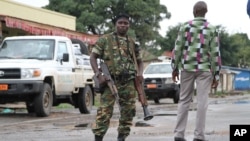Burundi’s foreign minister denied Monday that the country is in an escalating spiral of violence.
Alain Aime Nyamitwe told an emergency meeting of the U.N. Security Council via a video link from Bujumbura that the county “in general, is calm and citizens are moving about peacefully.”
He said there some neighborhoods in the capital where crime is “on-going” but questioned remarks by the envoy of the African Union (AU), who expressed concern that the violence is spreading beyond the capital.
“Contrary to certain information sent around by radical opposition and some media, Burundi is not in flames,” the foreign minister said. “There are certain acts of crime attempting to attract the attention of the international community, but they are being reigned in.”
Burundians Flee
But AU Envoy Tété Antonio told the council that the surge in violence and serious human rights violations has sent 200,000 Burundians fleeing to Tanzania, Rwanda, Uganda and the DRC.
“The targeted killings of political and military figures, extrajudicial killings, torture, as well as other cruel, inhuman and degrading treatment, arrests, clashes between police and armed elements, the regular discovery of bodies in streets of certain neighborhoods, have become the daily fate of the Burundian population,” Antonio said.
He also warned about inflammatory statements by officials, “such statements are unacceptable given the painful past of the Great Lakes region.”
The country’s security situation began to deteriorate after President Pierre Nkurunziza’s election to a controversial third term. His opponents accused him of violating the constitution and the Arusha Accord, which ended the country’s 13-year civil war.
Tipping Point
Speaking from Geneva, U.N. High Commissioner for Human Rights Zeid al-Hussein said the country is at an “extremely dangerous tipping point” and condemned inflammatory statements by the president and other officials.
“Phrases such as these recall language that this region has heard before, and should not be hearing again,” he said in reference to the 1994 Rwandan genocide.
The human rights chief also urged the Security Council to take concrete action to prevent further violence, including imposing asset freezes and travel bans on those who incite or engage in violence.
France called Monday’s emergency meeting and deputy ambassador Alexis Lamek told reporters his delegation had circulated a draft resolution calling on the parties to reject violence and engage in a meaningful dialogue.
“We express our intention to consider additional measures, including targeted sanctions, against all Burundian actors whose actions and statements contribute to the persistence of violence and impede the search for a peaceful solution,” Lamek said.
Britain holds the rotating presidency of the council this month and deputy ambassador Peter Wilson told reporters that council members are concerned that the risk of the crisis becoming ethnic in nature is increasing. He said there was a “clear appetite for action” among the 15 members and the council hopes to act on France’s draft resolution in the next few days.
On Monday, U.N. Secretary-General Ban Ki-moon took the step of appointing a Special Advisor to coordinate the U.N. system response in Burundi.




